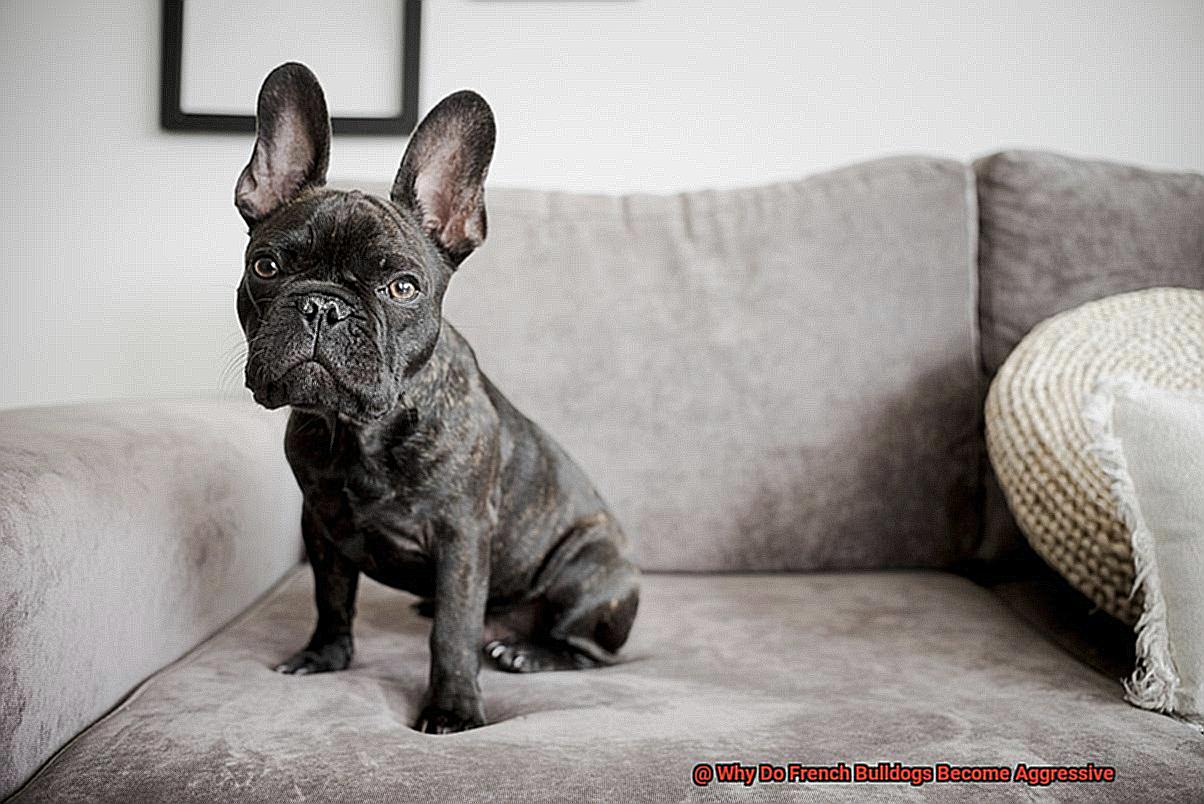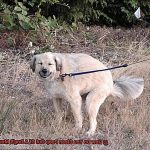Why Do French Bulldogs Become Aggressive?
Are you ready to unravel the mystery behind French bulldogs and their occasional aggressive tendencies? As proud owners of these adorable pups, we know that they are typically known for their playful and affectionate nature.
So why do some of them display aggression? In this post, we will delve into the reasons behind Frenchies’ aggressive behavior and offer tips on how to handle and prevent it.
So grab a croissant (or your favorite treat) and let’s explore the intriguing world of Frenchie behavior together.
Why Do French Bulldogs Become Aggressive?
Contents
- 1 Why Do French Bulldogs Become Aggressive?
- 2 The Role of Socialization in a French Bulldog’s Behavior
- 3 Breeding History: How it Affects Aggression in French Bulldogs
- 4 Medical Issues and Their Impact on a French Bulldog’s Behavior
- 5 Environmental Factors: Identifying and Managing Triggers for Aggression
- 6 Training Techniques for Addressing Aggression in French Bulldogs
- 7 Tips for Preventing Aggressive Behavior in French Bulldogs
- 8 Conclusion
As a French bulldog owner, it can be concerning and confusing when your once friendly and playful pup starts displaying aggressive behavior. Many owners may wonder, “Why is my French bulldog acting aggressive?” In this blog post, I will discuss the various factors that can contribute to aggression in French bulldogs and provide insight into managing this behavior.
- Genetics: While aggression is not a breed-specific trait, the genetics of a French bulldog can play a role in their behavior. Some lines may have a higher tendency towards aggression due to their breeding history. As an owner, it is important to research and understand the bloodlines of your French bulldog before adopting them.
- Socialization: Proper socialization from a young age is crucial for all dog breeds, especially for French bulldogs who are known to be sensitive and easily influenced by their surroundings. A lack of exposure to different people, animals, and environments can lead to fear-based aggression in French bulldogs.
- Territorial Instincts: Like many other breeds, French bulldogs can be territorial creatures, especially when it comes to their home and family. This instinct can cause them to become aggressive towards other animals or people that they perceive as a threat to their territory.
- Fear and Anxiety: Dogs, just like humans, can experience fear and anxiety, which can manifest in aggressive behavior. This can be triggered by various factors such as loud noises, unfamiliar situations, or past traumatic experiences.
- Lack of Training: Without proper training and socialization, French bulldogs may resort to aggression as a way of communicating their needs or boundaries. Positive reinforcement training is crucial in teaching them appropriate behaviors and responses.
- Medical Conditions: In some cases, aggression in French bulldogs can be a sign of an underlying medical condition such as pain or hormonal imbalances. It is important to consult a veterinarian if you notice sudden changes in your dog’s behavior.
- Owner’s Behavior: Dogs are highly attuned to their owner’s emotions and behaviors, and this can greatly influence their own behavior. If an owner is tense, anxious, or aggressive, it can cause their French bulldog to mirror these behaviors.
The Role of Socialization in a French Bulldog’s Behavior
French bulldogs are known for their charming personalities and playful demeanor. However, just like any other dog breed, they require proper socialization to develop good behavior. Lack of socialization can lead to fear and aggression in French bulldogs, causing them to become difficult to manage and potentially dangerous. As an expert on this topic, I believe it is essential for French bulldog owners to understand the significance of socialization in shaping their pet’s behavior and how it can prevent fear and aggression. So, let’s dive in.
What is Socialization?
Socialization is a process that involves exposing a puppy to different people, animals, and environments in a positive and controlled manner. This helps them learn appropriate behavior and become comfortable in new situations. It is crucial for puppies to be socialized during their critical period, which is between 3-14 weeks of age. During this time, their brains are highly receptive to learning and experiences, making it the perfect time to introduce them to various stimuli.
The Consequences of Poor Socialization
A lack of socialization can have severe consequences for a French bulldog’s behavior. It can lead to fear and anxiety, causing them to become aggressive towards people or other animals. This is especially common in dogs that have been kept isolated or have had limited interactions during their critical socialization period.
Starting Early: The Key to Success
As an owner, it is your responsibility to start socializing your French bulldog as early as possible. This means taking them on walks, introducing them to new people and dogs, and exposing them to different environments such as parks, beaches, and busy streets. However, it is crucial to keep in mind that socialization should be done gradually and in a positive manner. You do not want to overwhelm or scare your puppy during these interactions.
Exposure to Different People and Animals
In addition to people, French bulldogs should also be socialized with other animals, such as cats, birds, and other dogs. This will help them learn how to interact with different species and prevent aggression towards them in the future.
It is also important to expose your puppy to different types of people, including children, adults, and the elderly. This will help them become comfortable around all ages and prevent any fear-based aggression towards specific age groups.
Breeding History: How it Affects Aggression in French Bulldogs
As a French bulldog owner, you may have noticed that your furry companion has a unique and charming personality. However, just like any other dog breed, Frenchies can also exhibit aggressive behavior. This aggression can range from mild to severe and can be directed towards people or other animals. But have you ever wondered why some Frenchies are more prone to aggression than others? The answer lies in their breeding history.
The French bulldog breed originated from the crossbreeding of English bulldogs with local French terriers in the 1800s. These adorable dogs were primarily bred for companionship due to their affectionate and loyal nature. However, as their popularity grew, they were often bred for profit, resulting in irresponsible breeding practices such as inbreeding and line breeding.
So how do these breeding practices impact aggression in French bulldogs? Let’s dive deeper into the topic.
Inbreeding and Line Breeding:

Inbreeding involves mating closely related individuals, such as siblings or parent-offspring. On the other hand, line breeding involves mating dogs who share a common ancestor. Both these practices aim to produce puppies with desirable traits, but they can also result in health issues and behavioral problems, including aggression.
When two closely related dogs are bred, there is a higher chance of passing down genetic predispositions for aggressive behavior. This means that if a parent dog has a tendency towards aggression, their offspring may also inherit this trait.
Improper Socialization:
Proper socialization during a dog’s critical period (between 3-12 weeks of age) is crucial in shaping their behavior. However, irresponsible breeding can result in puppies being taken away from their mothers too early or not being exposed to different stimuli during this critical period. As a result, these dogs may develop fear and aggression towards people or other animals.
High Prey Drive:
French bulldogs are also known to have a high prey drive, meaning they have a strong instinct to chase and hunt smaller animals. This can contribute to aggressive behavior towards these animals, especially if they are not properly socialized or trained.
Medical Issues and Their Impact on a French Bulldog’s Behavior
French bulldogs, also known as “Frenchie,” have captured the hearts of dog lovers worldwide with their adorable smooshed faces and playful personalities. However, like all breeds, they are prone to certain medical issues that can impact their behavior, including aggression. As a French bulldog owner, it is crucial to understand these potential health concerns and how they may contribute to your pup’s aggressive behavior.
Brachycephalic Syndrome: The Breathing Struggle
One of the most common medical issues seen in French bulldogs is Brachycephalic Syndrome. This condition occurs due to their short snouts, making it difficult for them to breathe properly. As a result, Frenchies may become irritable and aggressive as a way to cope with their discomfort. If left untreated, this condition can lead to more severe respiratory problems, exacerbating the aggression.
Allergies, Skin Conditions, and Chronic Pain: The Unseen Culprits
French bulldogs are also prone to allergies, skin conditions, and chronic pain, which can significantly impact their behavior. These medical issues can cause discomfort and stress, leading to defensive and aggressive behavior. As a Frenchie owner, it is crucial to pay attention to any changes in your dog’s skin or signs of discomfort and address them promptly with your veterinarian.
Medications: The Double-Edged Sword
While medication can help treat these medical issues, some drugs may have side effects that can contribute to aggression in French bulldogs. It is essential to discuss any potential behavioral changes with your vet when starting a new medication for your Frenchie. They may be able to adjust the dosage or switch to a different medication if needed.
Hormonal Changes: The Mood Swing Factor
Hormonal changes can also play a significant role in a French bulldog’s behavior. Unneutered males may exhibit more aggressive behavior due to higher levels of testosterone, while females may become more protective and territorial during their heat cycle. Additionally, certain medical conditions, such as thyroid imbalances, can also affect a dog’s hormones and contribute to aggressive behavior. As a responsible owner, it is crucial to monitor your Frenchie’s overall health and address any potential hormonal imbalances with your vet.
Environmental Factors: Identifying and Managing Triggers for Aggression
As a proud owner of a French bulldog, you’re well aware of their lovable and quirky personalities. However, these sensitive and highly emotional dogs can easily become overwhelmed by their environment, leading to aggressive behavior. As an expert on the topic of French bulldogs and aggression, I want to share with you some valuable insights and tips on how to prevent aggression in these adorable pups by identifying and managing environmental triggers.
Lack of Socialization:
French bulldogs require early and consistent socialization with other dogs, people, and different environments to learn how to properly interact and handle different situations without feeling threatened or defensive. Make sure to expose your Frenchie to various situations and settings from a young age, such as dog parks, walks in busy areas, and interactions with different people.
Exercise and Mental Stimulation:

Frenchies have high energy levels and need daily exercise and activities to release their pent-up energy. Without proper outlets for their energy, they may become frustrated and exhibit aggressive behavior. Make sure to provide your Frenchie with enough physical activity and mental stimulation through games, toys, and training sessions.
Stressful Household:
French bulldogs thrive in calm and stable environments, so any disruptions or tension can make them feel anxious and insecure, leading to aggressive behavior. As owners, it’s important to create a peaceful household for your Frenchie by avoiding loud noises, maintaining a consistent routine, and providing a safe and quiet space for your dog when needed.
Identify Triggers:
It is crucial for owners to identify potential triggers for aggression in their French bulldogs, such as loud noises, unfamiliar people or animals, or changes in routine. Once these triggers are identified, work on managing them through desensitization techniques or providing a safe space for your Frenchie when needed.
Positive Reinforcement Training:
Proper training is essential in managing a French bulldog’s aggression. Positive reinforcement methods should be used to teach the dog appropriate behaviors in different situations, as well as how to effectively communicate with the dog to prevent misunderstandings that can lead to aggression.

Training Techniques for Addressing Aggression in French Bulldogs
Addressing aggression in any dog can be a challenging and sometimes intimidating task. However, when it comes to French bulldogs, it’s important to understand their unique personality and training needs in order to effectively address any aggressive behaviors. As an expert in training French bulldogs, I have seen firsthand the benefits of utilizing positive reinforcement methods and establishing yourself as the pack leader during training. In this section, I will discuss the importance of these techniques and how they can help address aggression in French bulldogs.
Establishing Yourself as the Pack Leader:
One of the main causes of aggression in French bulldogs is a lack of clear leadership from their owners. These dogs have a strong and sometimes stubborn personality, and without a confident and consistent leader, they may become confused and exhibit aggressive behaviors. It is important for owners to establish themselves as the pack leader by setting rules and boundaries, being consistent in their training, and providing structure for their dog.
Using Positive Reinforcement Techniques:
Punishment-based training methods may seem like a quick fix for addressing aggression in French bulldogs, but they can actually make the problem worse. These dogs respond much better to positive reinforcement techniques, such as clicker training or using treats, which reward desired behaviors rather than punishing negative ones. By using positive reinforcement, you can teach your French bulldog what behaviors are acceptable and redirect any aggressive tendencies.
Socialization from an Early Age:
Socialization is key in preventing fear-based aggression in French bulldogs. It is important to expose your dog to various people, animals, and environments from a young age so they can learn to feel comfortable and confident in different situations. This can also help prevent any territorial or possessive aggression towards people or other animals.
Consistency is Key:
Consistency is crucial when training French bulldogs, especially when addressing aggression. These dogs thrive on routine and may become confused or anxious if the rules and boundaries are not consistent. It’s important for all members of the household to be on the same page and use consistent training techniques to prevent any confusion or conflicting messages.
Seeking Professional Help:
Sometimes, addressing aggression in French bulldogs may require the help of a professional trainer. They have experience and expertise in dealing with aggressive behaviors and can provide personalized training plans for your specific dog. If you are struggling with your dog’s aggression, don’t hesitate to seek out a professional for guidance and support.
Tips for Preventing Aggressive Behavior in French Bulldogs
French bulldogs are known for their friendly and affectionate nature, but just like any other breed, they can exhibit aggressive behavior under certain circumstances. So let’s dive in and learn how to prevent this behavior and ensure a happy and harmonious relationship with your French bulldog.
One of the most important factors in preventing aggression in French bulldogs is proper socialization. This means exposing them to different people, animals, and environments from a young age. This helps them develop confidence and adaptability, reducing the chances of aggressive behavior towards unfamiliar situations. As an expert, I recommend puppy socialization classes or setting up playdates with other well-behaved dogs to help your French bulldog learn appropriate behavior.
Using positive reinforcement techniques such as rewards and praise can also help prevent aggression in French bulldogs. This means rewarding them for good behavior rather than punishing them for bad behavior. Consistent positive reinforcement can help your dog learn appropriate ways to behave and strengthen your bond with them. On the other hand, punishment can lead to fear and anxiety in your dog, which can manifest as aggression.
Proper training is also essential for French bulldogs to learn obedience and appropriate behaviors. This includes basic commands such as sit, stay, and come, as well as more advanced training to address specific behavioral issues. A well-trained dog is less likely to display aggressive behaviors. However, it is important to note that training should always be done using positive reinforcement techniques and never through punishment or force.
As pack animals, French bulldogs need a strong leader to follow. As their owner, it is important that you establish yourself as the leader through consistent rules and boundaries. This helps prevent your dog from feeling the need to assert dominance through aggressive behavior. Remember to be patient and consistent in your training and leadership, as this will help your French bulldog understand their place in the pack.
Exercise is also crucial in preventing aggression in French bulldogs. Just like humans, dogs need regular exercise to release pent-up energy and maintain good physical and mental health. A lack of exercise can lead to frustration and behavioral issues in French bulldogs, including aggression. Make sure to provide your dog with enough physical activity based on their age and health condition.
It is also important for owners to understand what triggers their French bulldog’s aggressive behavior. This could be certain situations, objects, or even people that cause your dog to become defensive or fearful. By identifying these triggers, you can work on desensitizing your dog and reducing the likelihood of aggressive outbursts.
Also Read: Do Dog Groomers Always Express Glands
Conclusion
In conclusion, owning a French bulldog can bring joy and companionship to any dog lover’s life. These lovable pups are known for their playful and affectionate nature, making them a popular breed. However, like any dog, Frenchies may exhibit aggressive behavior, which can be concerning and confusing for owners.
Throughout this blog post, we have explored the various factors that contribute to aggression in French bulldogs. From genetics to socialization, territorial instincts to fear and anxiety, lack of training to medical conditions, and even the owner’s behavior – all play a role in shaping a Frenchie’s behavior.
We have also emphasized the importance of socialization in preventing fear-based aggression in Frenchies. By exposing them to different people, animals, and environments at an early age, we can help them develop into well-adjusted and confident dogs.
Moreover, we have discussed how breeding history and environmental triggers can also impact a Frenchie’s tendency towards aggression. It is crucial for owners to identify these triggers and manage them through proper socialization techniques, regular exercise, positive reinforcement training methods, consistent leadership, and seeking professional help when necessary.
By following these tips and understanding your Frenchie’s unique personality traits, you can prevent aggressive behavior and maintain a happy relationship with your furry companion. Remember to always use engaging language with a professional tone when addressing behavioral issues in your dog.




